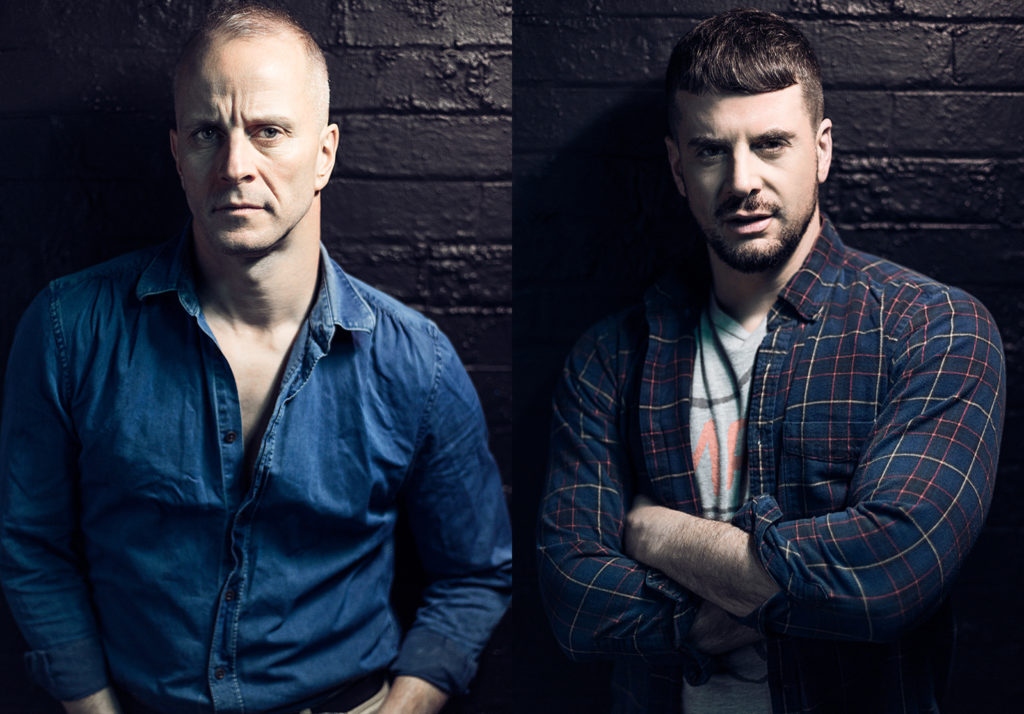Jonny Woo and Alexis Gregory on queer theatre, injecting comedy into murder and their intense play Sex/Crime

Artist Jonny Woo (L) and actor Alexis Gregory. (The Glory)
Strung up in a dank basement, a leather mask clamped to his face, a man known only as ‘B’ waits for his orders.
He has paid ‘A’ to play the role of a ‘gay serial killer’. With the right money, A will push a client to the brink of their borderlines.
But B proves to be a challenging client, after booking a slot with his temporary master only for it to fall short of murder
PinkNews sat down with playwright and actor Alexis Gregory (B) about his play Sex/Crime, as well as Jonny Woo, the show’s co-star (A).
First developed at Woo’s pub The Glory in 2018, the critically-acclaimed queer play transfers to Soho Theatre next week for ten nights, directed by Robert Chevara.
Why did you choose crime as a subject matter for this play? Do you think true crime is a popular focal point for works of art nowadays and why?
Alexis: Crime and police fiction, specially with TV series, are having a peak moment, yes, and I think the psychological aspect of a crime dramas is appealing to people.
The play Sex/Crime opens up a further human discussion – it’s a useful device.
I did actually want to be a police officer when I was a kid. I was obsessed TV cop dramas – and cops!
Why did you decide to explore murder in a queer context?
Alexis: I wanted to ‘queer’ the thriller and make it our own.
This is a very queer play is in terms of themes, context and style; explicitly so, but it’s also universal.
Setting a crime in an underworld is of course a perfect setting for a dark and challenging exploration of hidden lives, and most of my plays – like ‘Slap’, and ‘Safe’ – focus on unheard stories.
Have you developed a unique process for working together as a duo on this?
Jonny: We definitely work well together. I’m not sure it’s a unique process, we are both very determined, we get it on its feet and we do it.
We had never worked before together and when Alexis showed me the play, and we decided we should be the characters, it just made sense.
We have fun and working with Robert Chevara who is just amazing. I suppose it’s unique in that it’s been a new collaboration, this. And we really go for it!
Alexis: In rehearsals and in the performance, Jonny and I are are definitely in tune with each other. I think we work great together – there is a very good stage chemistry between Jonny and me. But don’t take my word for it. Come and decide for yourself.
You’ve both had success on your own, is it easier to work with a partner compared to working solo?
Jonny: Oh my God, I love collaborating.
Solo work while rewarding and challenging can be lonely stuff. I’ve toured on my own and I much prefer working with other people now, whether on group shows, or projects like this.
Most of my “Jonny” ventures are collaborations now – like A Night At The Musicals, All Star Brexit and Transformer. You get something special out of it and audiences enjoy the energy that comes off that.
Alexis: As an actor, I’m used to working with cast-mates.
Riot Act, my first time doing a solo show, and that was very intense, not just because of the material but because it’s just you up there on that stage.
Acting in Sex/Crime is very intense in its own different way, the script is very challenging and a two-hander is demanding.
What do the victims of the play’s killers represent? Is it a manifestation of the two men’s loneliness?
Alexis: The unseen killer, whom Jonny and my character obsess over, does definitely represent part of both of our characters, yes.

Artist Jonny Woo (L) and actor Alexis Gregory. (The Glory)
The idea of fetishising and obsessing over such heinous crimes is used to highlight what happens in a society that has a lack of boundaries; with one line crossed after the next.
What was the reasoning behind deliberately leaving the two characters unnamed and instead having ‘A’ and ‘B’?
Alexis: To establish them as anonymous I think, and interchangeable.
It keeps the characters ’businesslike’; in the way they interact with each other; both sexually and in regards to the violence and also the way they negotiate much of the action as mere ‘transactions’.
How does this ‘darker’ show compare to your previous work?
Jonny: Hmmm, I’m always drawn to darker subjects. I’m not easy to shock really, so I relish the darkness of this piece.
My early cabaret work was often dark and challenging and I think Sex/Crime is pretty much inline with other work I’ve done.
We did a modern adaptation of Edgar Allen Poe’s Tell Tale Heart at The Glory, and the director Giorgio Spigelfeld made it into an East London drug addict’s gothic nightmare, so this is pretty much inline with all that.
Of course, many of my drag appearances, out and about, and on festival stages, can be more sparkly and cheeky – people like their drag with a drink and a wink, but deep down I’ve always loved darker subjects – my early drag looks had lots of nudity and were often quite scary, and still can be!
As an ‘alternative drag legend’, is it a drastic change to be on stage but out of drag? What are the differences and is one preferable?
Jonny: Aww thats nice to be called a legend. You know what – it’s a relief to be in flats! I think the main difference here is that I’m working with a script and a rehearsal process, so I don’t need to rely on the tropes of drag and cabaret.
Cabaret is very in the moment and the ‘drag’ styling if you like helps me access a personae that works in that setting, that lends itself to improv – you bounce off the audiences and after twenty years you get quite good at that.
But with a proper play like Sex/Crime I like performing with a tight script and direction – it help me access other skills and the performance can become really heightened, Sex/Crime packs a big punch!
Sex/Crime is a scary play about murder but it also makes audiences laugh, how do you inject the comedy into it?
Alexis: I love writing and performing comedy. Being able to make audiences laugh feels like such a gift.
All of my shows, however hard-hitting, involve humour and the humour in Sex/Crime is totally outrageous. It’s also used to draw the audience in, flirt with them, and keep them on their toes.
It challenges them and makes them question their responses. I’m old school thought – I love a good one-liner and I couldn’t resist putting some punchlines into the script.
Jonny: The comedy is just there in the writing, Sex/Crime has scenes that are just hilarious. For me the show is a thriller, yes, and a very modern horror, but it’s definitely a satire that pokes fun at the gay male existence.
Alexis’s writing uses humour to dig the knife in even deeper. Yes there are murder scenarios, but you’ll see your own private life in there too.
Does the show explore the sexual relationship of the two men in comparison to their murderous relationship? Are they different or the same?
Alexis: It all interlinks and crosses over; sex, desire, fetish, violence, power and various taboos.
Every boundary in Sex/Crime is very is blurred and then crossed!
It looks from the trailer like the men try and dominate each other, or role play with each other, is there a focal point of the play – is it a battle between the men?
Alexis: The status between ‘A’ and ‘B’ shifts, and is always shifting between the two men, yes.
Power is another commodity that ‘A’ and ‘B’ barter over, as do many gay couples.
We explore sexual dominance but also class and social status. It’s an hour-long white knuckle ride, there’s a lot in there.
Why do you think pieces of queer theatre are so important? Is it solely about representation in the arts or is there more to it than that?
Jonny: Queer folk make queer work. It’s our truth, our stories.
Alexis: For me it is about more than just representation.
I’m really passionate about putting queer lives on stage and exploring our truths and the complications and contradictions that come with those truths.
Do you think queer theatre is having an emerging moment currently? How do you think it can be sustained as a movement?
Alexis: It’s definitely having a moment and has been for the last couple of years. Suddenly our lives are mainstream in an extraordinary turn around. I don’t want our stories sanitised though, or told purely for the unchallenged gaze.
Nor do I feel our stories, and indeed our lives, should be dubbed down or made more palatable for others; for straight and queer audiences alike.
I hope that we are not a trend.
I’m seeing some really radical queer programming in some London theatres at the moment too and I think that is really exciting.
Do you connect with the subject matter of Sex/Crime on a personal level or is it strictly a piece of theatre for you both?
Alexis: All of my plays come from an autobiographical place and I only write about subjects that excite me and matter to me, obviously not always literally with a play like Sex/Crime and its associated murderous intentions!
But I understand all of my characters, their joy and pain, their successes and triumphs – my life is in there, yes. I hope people find Sex/Crime expansively human in its themes and the ground that we cover.
As I said, it’s a jam-packed rollercoaster ride.
Jonny: Sex/Crime stands alone I think as a modern horror, it doesn’t need to be pigeon-holed.
It can be, but the very reason we chose Soho Theatre to develop the show is that it’s a good play which we think is performed and directed well and has resonance across the audience spectrum.
You don’t need to be gay to understand Sex/Crime or enjoy it. Of course the words resonate for us gay men, there’s devil in the detail, but at the end of the day it’s just a bloody good piece of theatre that Alexis has written!
This is the latest in a long list of successful plays Alexis. What’s next for you?
Alexis: Straight after Sex/Crime, I am back on the road in February for LGBT History Month touring Riot Act again, my solo show about queer activism though the decades.
We have one London date at The Turbine Theatre actually on February 16th so come to that!
Then I need to get to work on the three other plays I am developing as well as the Riot Act film which is moving ahead nicely.
Sex/Crime is at Soho Theatre from 21st Jan – 1st Feb
There are special post-show talks on both Saturday performances, see Soho Theatre website for details.

